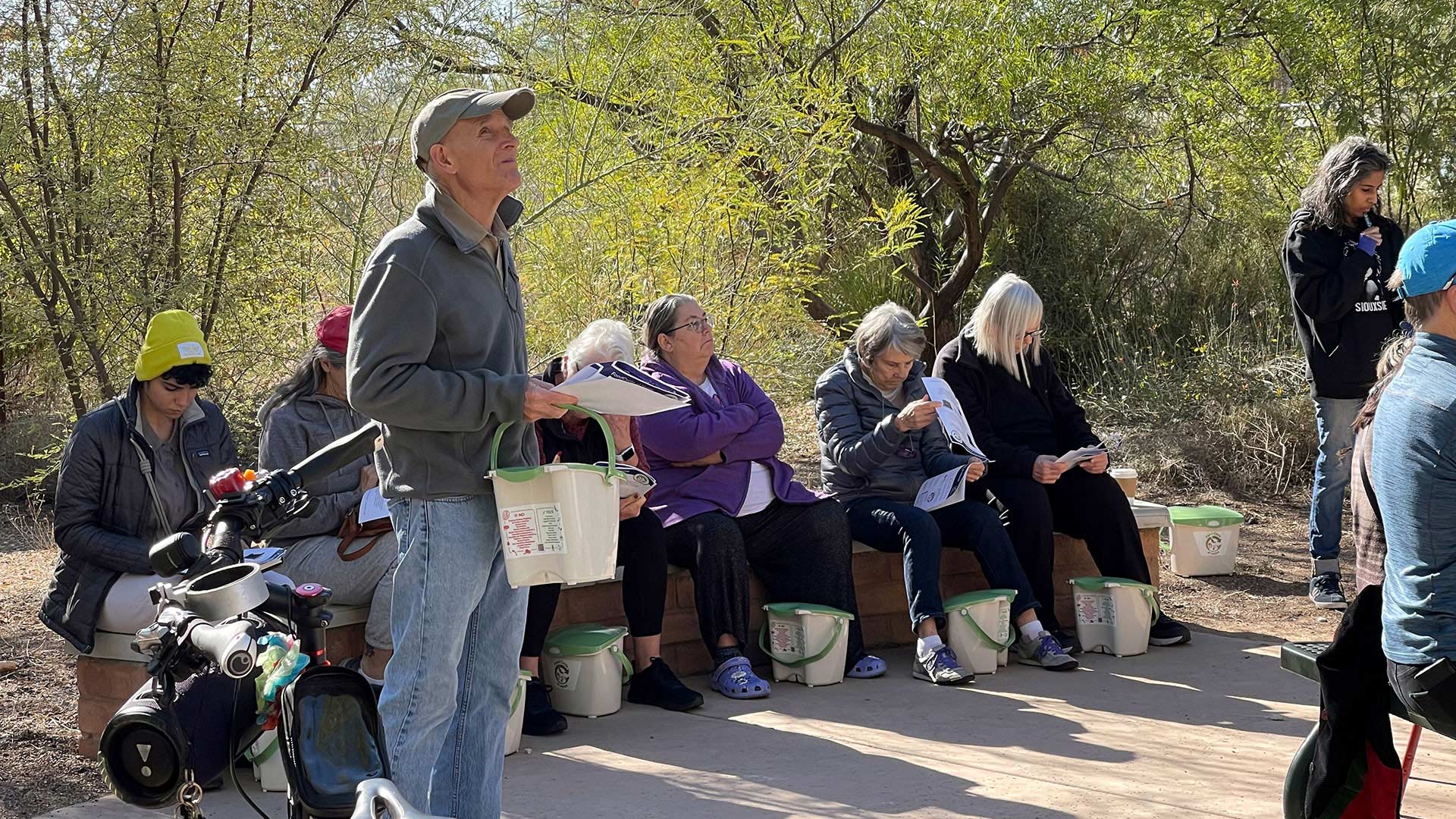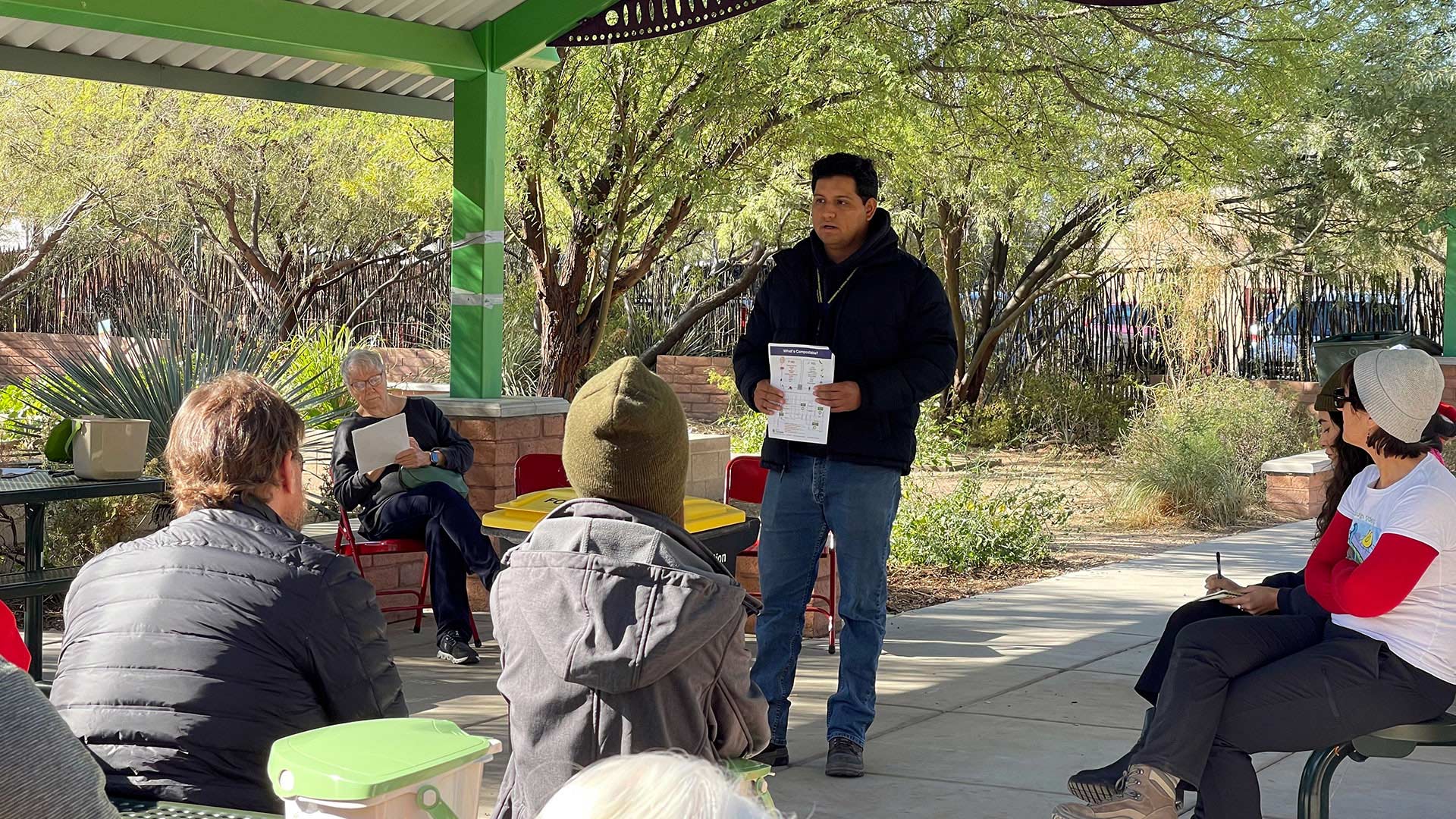 A participant waits at an information session on composting and Tucson's new FoodCycle at Home program in Tucson, Ariz., on Saturday, Dec. 9, 2023.
A participant waits at an information session on composting and Tucson's new FoodCycle at Home program in Tucson, Ariz., on Saturday, Dec. 9, 2023.
Around 50 environmentally conscious Tucsonans gathered at Blue Moon Community Garden last weekend, clutching pails with green lids and listening intently to a presentation about garbage.
They are some of the first volunteers of the city’s FoodCycle At Home program, a new expansion of the city’s efforts to reduce the amount of food waste that reaches landfills.
According to Jose Garcia of the city’s Environmental and General Services, 40% of what arrives at Tucson landfills is organic material. As organic waste breaks down, it releases greenhouse gases like sulfur and methane, which poses logistical problems for landfills and contributes to global warming.
“Landfills, just for environmental compliance, have to monitor and have it treated. The best way of all is just eliminating organics out of the equation. Food waste diversion helps us tackle that problem directly,” Garcia said.
The ongoing FoodCycle program started in 2021, beginning exclusively with Tucson businesses. In their first year, they composted 261 tons of material, according to the city's Zero Waste Road Map. With the residential program launching in January, the city is hoping to increase that number.
 VIEW LARGER Jose Garcia speaks at an information session on the City of Tucson's at-home composting program at Blue Moon Community Garden in Tucson, Ariz., on Saturday, Dec. 9, 2023.
VIEW LARGER Jose Garcia speaks at an information session on the City of Tucson's at-home composting program at Blue Moon Community Garden in Tucson, Ariz., on Saturday, Dec. 9, 2023. A good portion of daily household food waste is eligible for collection, including fruit, eggshells, coffee grounds, and even bread and leftover pastries. But program directors say it’s important to keep certain items out of the bin to avoid contamination.
Unapproved items include meats, oils including butter, bones, and any plastics.
When asked about putting hair and toenail clippings in the bins, Garcia said to kindly leave those items out for the health and safety of city workers.
He also said that for those concerned about keeping a bucket of decomposing food in their kitchen, freezing food scraps until the day residents drop them off is just fine, and can reduce odors.
After the information session, participant Jacqueline Barrios said the program is a small way she can make a difference.
“I think it’s going to start impacting how you consume, maybe less meat, maybe less packaging, because I want things to go inside the pail,” she said.
The program has partnered with Community Gardens of Tucson, an organization that operates 17 community gardens around the city, and coordinated the delivery of compost to their growing centers.
“Your food waste is helping to create a product that will help grow more food,” Garcia said.
As the program continues, Garcia said he hopes to expand to school gardens and even local farmers.
Collection begins Jan. 2nd. More information sessions will be held in the new year.
FoodCycle at Home Drop-Off Sites:
- Little Leaf Garden: 1315 W. Speedway Boulevard
- New Spirit Garden: 8701 E. Old Spanish Trail
- Blue Moon Garden: 1501 N. Oracle Road
- Clements Center: 8155 E. Poinciana Drive
- Pio Decimo Garden: 835 S. 7th Avenue
- Highland Vista Garden: 5300 E. 7th Street

By submitting your comments, you hereby give AZPM the right to post your comments and potentially use them in any other form of media operated by this institution.